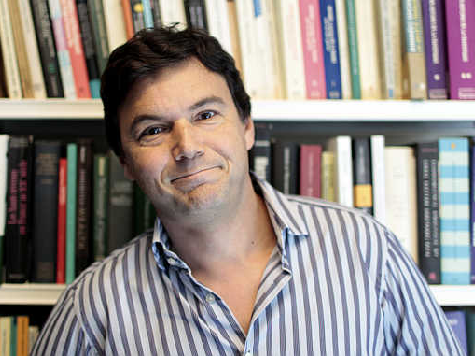
Thomas Piketty has written a new book that is causing a great commotion inside and outside of liberal economic circles, among Americans who think themselves to be “progressive” but are really just plain socialists.
The basic thesis of the book, Capital in the Twenty-First Century, is that wealth is becoming concentrated at the top of the industrial nations and, accordingly, that we must raise taxes on successful people to address this concern. The author notes:
[A] progressive tax is a crucial component of the social state: it played a central role in its development and in the transformation of the structure of inequality in the twentieth century, and remains important for ensuring the viability of the social state in the future.
A member of the Paris School of Economics, Piketty has written a hefty defense of the liberal welfare state, one that is filled with statistics and data but is perhaps most notable for its omissions. The book assumes that the unitary “social state” of which France is the foremost example is the best means of ensuring economic equality, and that increasing taxes on successful people (and, really, everyone else) will help to address the perceived problem of “inequality.”
In fact, France and the other nations of the EU are among the least equal countries on the planet when measured in terms of economic opportunity. The concentration of wealth and privilege among the business elites of France, Germany, Holland, and Italy are extreme. More important, there is virtually no mobility – no opportunity for people to move from one social economic level to the next.
The social formulation that was preserved after WWII in the name of fighting the Cold War against the Soviet Union has hardened and ossified into a near-permanent institutional reality throughout Western Europe. Just look at the hundreds of thousands of Parisians who have fled François Hollande’s “champagne socialism” in France for the relative freedom of the UK over the past two years if you want a true appraisal of economic opportunity in modern Europe today.
One of the chief weaknesses of Piketty’s analysis is a lack of historical context, a trap that often ensnares economists. He notes that income inequality was lessened as a result of WWI and WWII, an insight that is hardly surprising, but he then proceeds to conclude that feeding the government via higher taxes and more social engineering directed from the “commanding heights,” to borrow the Marxist term attributed to Vladimir Lenin, is somehow the answer. He ignores the fact that much of the wealth created since 1945 has come via individual efforts and the private sector.
Piketty argues that when the rate of return on capital exceeds economic growth, there is increasing wealth concentration. He projects that this disparity could reach or surpass 19th century oligarchic levels and result in political and social upheaval. He proposes a global wealth tax as the solution to rising inequality. But of course Piketty assumes that the level of taxation, and not other factors such a free trade, deficit spending, and the related “tax” of inflation, are not the culprits when it comes to “inequality.”
Kevin A. Hassett, Director of Economic Policy Studies at American Enterprise Institute, provides a wonderful critique of Piketty’s analysis on the AEI web site. He notes a number of methodological errors in Piketty’s analysis, chief among them the idea that the elasticity of substitution between capital and labor is greater than 1, which is to say that capital and labor can be easily substituted. This would mean that higher levels of capital accumulation by wealthy people would not reduce the return on capital very much, so that capital share of income would skyrocket.
However, Hassett points out that the elasticities in the economics literature are much lower than Piketty needs to support his story, and even these estimates are high because they exclude important factors from the analysis, something Piketty includes. In plain English: if you cannot make a hamburger with a building, then capital and labor cannot easily be substituted for each other, and the collapse of capitalism that Piketty predicts does not occur.
Of note, Hasset continues, a significant portion, and in some countries the entire amount of the observed increase in capital’s share of national income in Piketty’s data, is attributable to increases in housing. Indeed, if housing is excluded, the sharp increase in capital is almost eliminated, and the collapse of capitalism he projects disappears. This point is very significant because the housing sector and home ownership, though frowned upon in the authoritarian nations of the EU, has been a significant driver of economic opportunity and personal wealth creation in the US since WWII.
The elitist vanguard among the liberal intelligentsia hail Piketty’s apology for higher taxation, but Americans who are truly interested in addressing inequality of income and economic status should shun his flawed Eurocentric analysis. Raising taxes to enrich the government’s coffers and strengthen official elites who control the levers of power in the public sector is not the way to increase individual prosperity in the industrial nations.
Raising taxes is not the solution to income inequality, as Piketty argues in his one-sided but lengthy work. Rather, we need to reduce taxes and the oppressive role of the state, reduce fiscal deficits and persistent inflation, and increase opportunities for individuals to work and accumulate wealth through the free enterprise system. Work and freedom, at the end of the day, are the best remedies for “inequality.”

COMMENTS
Please let us know if you're having issues with commenting.